译林牛津版高中英语Module 6 Unit 3 understanding each other reading I---cultural differences教学课件
- 格式:pptx
- 大小:2.43 MB
- 文档页数:37
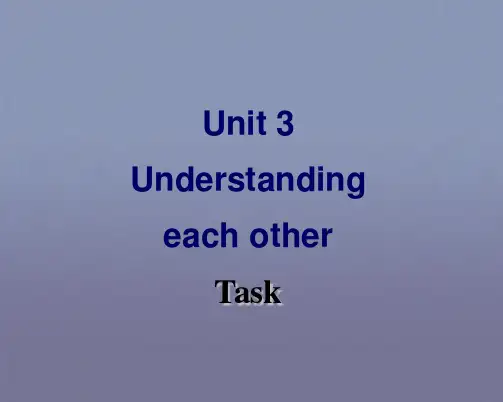
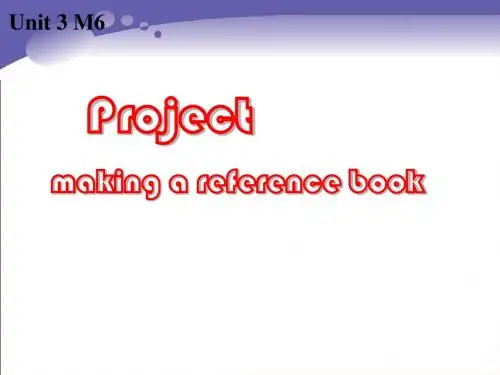
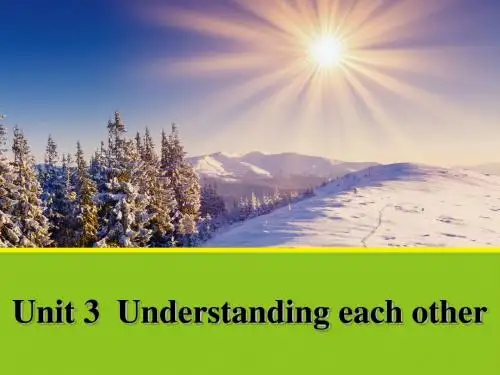
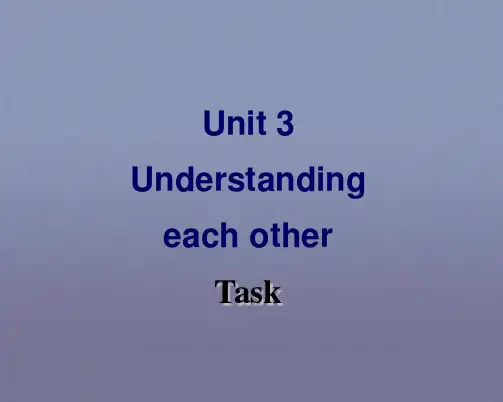
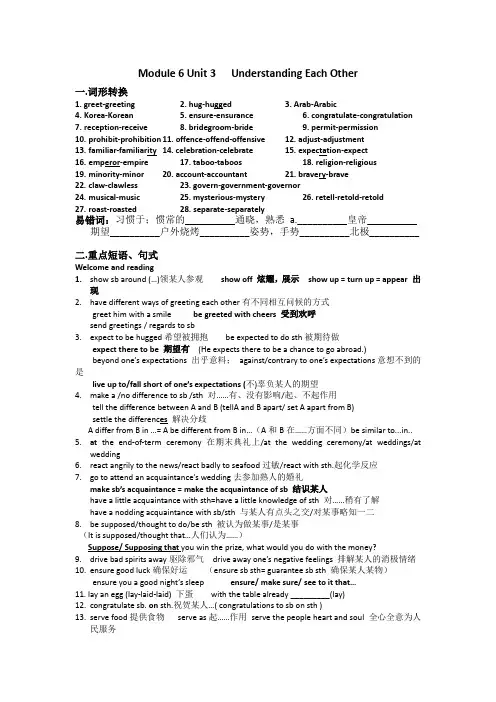
Module 6 Unit 3 Understanding Each Other一.词形转换1. greet-greeting2. hug-hugged3. Arab-Arabic4.Korea-Korean5. ensure-ensurance6. congratulate-congratulation7.reception-receive8. bridegroom-bride9. permit-permission10.prohibit-prohibition 11. offence-offend-offensive 12. adjust-adjustment13.familiar-familiarity 14. celebration-celebrate 15. expectation-expect16.emperor-empire 17. taboo-taboos 18. religion-religious19.minority-minor 20. account-accountant 21. bravery-brave22.claw-clawless 23. govern-government-governor24.musical-music 25. mysterious-mystery 26. retell-retold-retold27.roast-roasted 28. separate-separately易错词:习惯于;惯常的__________通晓,熟悉 a.__________皇帝__________ 期望__________户外烧烤__________姿势,手势__________北极__________二.重点短语、句式Welcome and reading1.show sb around (…)领某人参观show off 炫耀,展示show up = turn up = appear 出现2.have different ways of greeting each other有不同相互问候的方式greet him with a smile be greeted with cheers 受到欢呼send greetings / regards to sb3.expect to be hugged希望被拥抱be expected to do sth被期待做expect there to be 期望有(He expects there to be a chance to go abroad.)beyond one’s expectations 出乎意料;against/contrary to one’s expectations意想不到的是live up to/fall short of one’s expectations (不)辜负某人的期望4.make a /no difference to sb /sth 对……有、没有影响/起、不起作用tell the difference between A and B (tellA and B apart/ set A apart from B)settle the differenc es解决分歧A differ fromB in …= A be different from B in…(A和B在……方面不同)be similar to...in..5.at the end-of-term ceremony在期末典礼上/at the wedding ceremony/at weddings/atwedding6.react angrily to the news/react badly to seafood过敏/react with sth.起化学反应7.go to attend an acquaintance’s wedding去参加熟人的婚礼make sb’s acquaintance = make the acquaintance of sb 结识某人have a little acquaintance with sth=have a little knowledge of sth 对……稍有了解have a nodding acquaintance with sb/sth 与某人有点头之交/对某事略知一二8.be supposed/thought to do/be sth 被认为做某事/是某事(It is supposed/thought that…人们认为……)Suppose/ Supposing that you win the prize, what would you do with the money?9.drive bad spirits away驱除邪气drive away one’s negative feelings 排解某人的消极情绪10.ensure good luck确保好运(ensure sb sth= guarantee sb sth 确保某人某物)ensure you a good night’s sleep ensure/ make sure/ see to it that…11. lay an egg (lay-laid-laid) 下蛋with the table already _________(lay)12.congratulate sb. on sth.祝贺某人…( congratulations to sb on sth )13.serve food提供食物serve as起……作用serve the people heart and soul 全心全意为人民服务14.permit doing / permit sb to do sth ;health permitting (= if health permits)健康许可的话time/weather permittingwithout permission 未经许可ask for one’s permission without permissionapply for a fishing/parking permit申请钓鱼、停车许可证15.prohibit/ forbid/ ban (doing) sth 禁止做…… prohibit/forbid/ ban sb. from doing.forbid sb. to do 禁止某人做…16.play loud drums to celebrate the wedding 擂鼓庆祝婚礼in celebration of sth 为了庆祝……throughout the night 彻夜(= all night long) throughout the world (all over; across; around)17.sit in separate areas separate sb. from...18.cause offence (to sb) 冒犯(mean) no offence 无意冒犯commit an offence 犯罪(sb.) be/feel offended at/by his offensive words (=be upset/angry about…)对感到恼火、生气19.adjust to/adjust oneself to doing sth (=adapt) 适应做……adjust the speed/ the height of the seat 调节、调整速度,座椅高度20.be/get/become used to/accustomed to (doing) sth习惯于做某事21.point with one’s first finger/thumb 用食指/大拇指指be all thumbs 笨手笨脚green thumb/green fingers 园艺技能22.take off 起飞,脱下,突然走红take on 采纳,承担,呈现,雇佣take over 接管;占上风take up 占据,开始从事, 接着做take in 吸收;理解;欺骗23.look alike 看起来像Great minds think alike. 英雄所见略同24.be amazed/surprised at sth. 对……惊讶25.have fond childhood memories 有这美好的童年记忆26.sb be familiar with sth = sth be familiar to sb… 熟悉……27.It’s time for me to go. =It’s time that I went/should go.(should不省)28.share sth in common有……共同处have something in common (with sb/sth) (与……)有一些共同之处in common with 与...相同common sense 常识common practice 惯常做法share the same importance. ( be equally important)同样重要29.do/manage/go without (sth.) 没有……也行;将就E.g. She can’t do without a secretary.In Britain, if personal fireworks are not permitted, people will just do without.30.set off/let off fireworks 燃放爆竹,烟火set off for sp出发去be set in 以… 为背景set out to do = set about doing = get down to doing 着手做某事Important sentences in Reading31.It’s rude not to open a presen t when someone gives you one.32.Roosters are supposed to drive bad spirits away from the wedding ceremony and hens arethought to ensure good luck for the marriage.人们认为公鸡能赶走邪气,而母鸡能给婚姻带来好运。
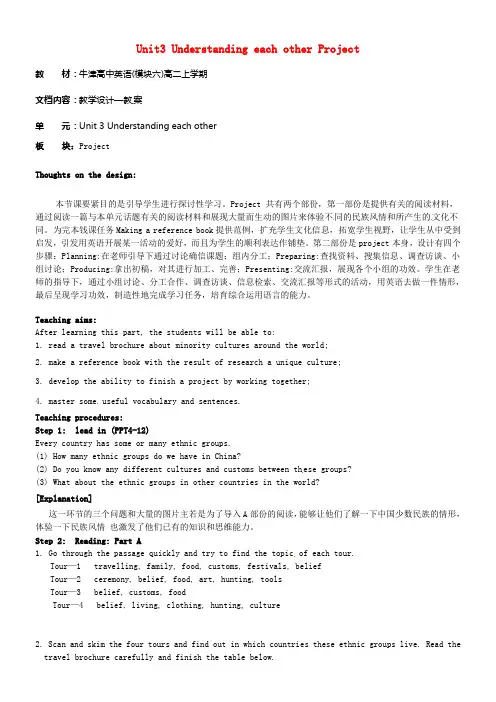
Unit3 Understanding each other Project教材:牛津高中英语(模块六)高二上学期文档内容:教学设计—教案单元:Unit 3 Understanding each other板块:ProjectThoughts on the design:本节课要紧目的是引导学生进行探讨性学习。
Project 共有两个部份,第一部份是提供有关的阅读材料,通过阅读一篇与本单元话题有关的阅读材料和展现大量而生动的图片来体验不同的民族风情和所产生的文化不同。
为完本钱课任务Making a reference book提供范例,扩充学生文化信息,拓宽学生视野,让学生从中受到启发,引发用英语开展某一活动的爱好,而且为学生的顺利表达作铺垫。
第二部份是project本身,设计有四个步骤:Planning:在老师引导下通过讨论确信课题;组内分工;Preparing:查找资料、搜集信息、调查访谈、小组讨论;Producing:拿出初稿,对其进行加工、完善;Presenting:交流汇报,展现各个小组的功效。
学生在老师的指导下,通过小组讨论、分工合作、调查访谈、信息检索、交流汇报等形式的活动,用英语去做一件情形,最后呈现学习功效,制造性地完成学习任务,培育综合运用语言的能力。
Teaching aims:After learning this part, the students will be able to:1. read a travel brochure about minority cultures around the world;2. make a reference book with the result of research a unique culture;3. develop the ability to finish a project by working together;4. master some useful vocabulary and sentences.Teaching procedures:Step 1: lead in (PPT4-12)Every country has some or many ethnic groups.(1) How many ethnic groups do we have in China?(2) Do you know any different cultures and customs between th ese groups?(3) What about the ethnic groups in other countries in the world?[Explanation]这一环节的三个问题和大量的图片主若是为了导入A部份的阅读,能够让他们了解一下中国少数民族的情形,体验一下民族风情也激发了他们已有的知识和思维能力。
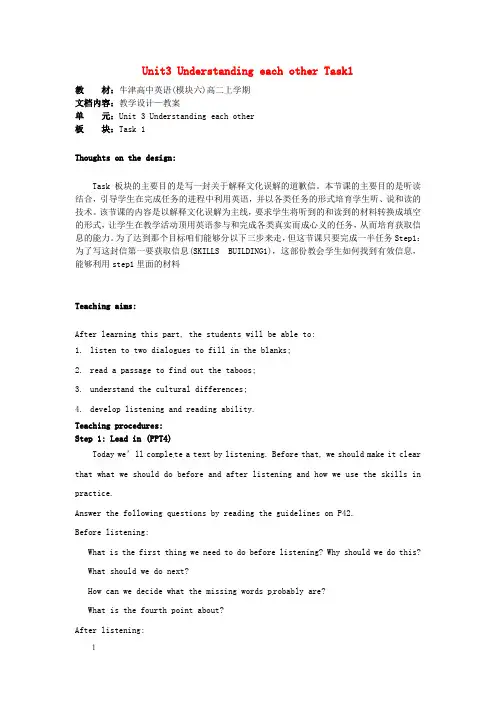
Unit3 Understanding each other Task1教材:牛津高中英语(模块六)高二上学期文档内容:教学设计—教案单元:Unit 3 Understanding each other板块:Task 1Thoughts on the design:Task板块的主要目的是写一封关于解释文化误解的道歉信。
本节课的主要目的是听读结合,引导学生在完成任务的进程中利用英语,并以各类任务的形式培育学生听、说和读的技术。
该节课的内容是以解释文化误解为主线,要求学生将听到的和读到的材料转换成填空的形式,让学生在教学活动顶用英语参与和完成各类真实而成心义的任务,从而培育获取信息的能力。
为了达到那个目标咱们能够分以下三步来走,但这节课只要完成一半任务Step1:为了写这封信第一要获取信息(SKILLS BUILDING1),这部份教会学生如何找到有效信息,能够利用step1里面的材料Teaching aims:After learning this part, the students will be able to:1.listen to two dialogues to fill in the blanks;2.read a passage to find out the taboos;3.understand the cultural differences;4.develop listening and reading ability.Teaching procedures:Step 1: Lead in (PPT4)Today we’ll comple te a text by listening. Before that, we should make it clear that what we should do before and after listening and how we use the skills in practice.Answer the following questions by reading the guidelines on P42.Before listening:What is the first thing we need to do before listening? Why should we do this?What should we do next?How can we decide what the missing words p robably are?What is the fourth point about?After listening:What do you think we should do after we have finished a passage? [Explanation]通过问问题的形式将书上的任务指导展示给学生,然后将重点拿出来放在课件上,如此学生对如何通过听来完成上下文就超级清楚。
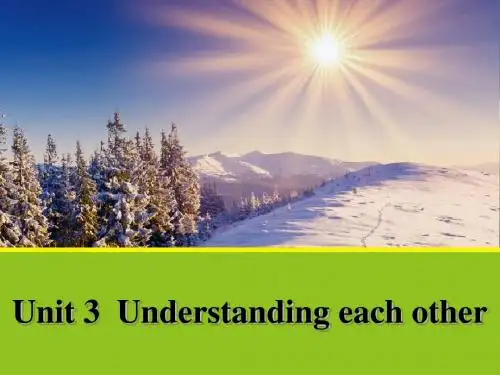
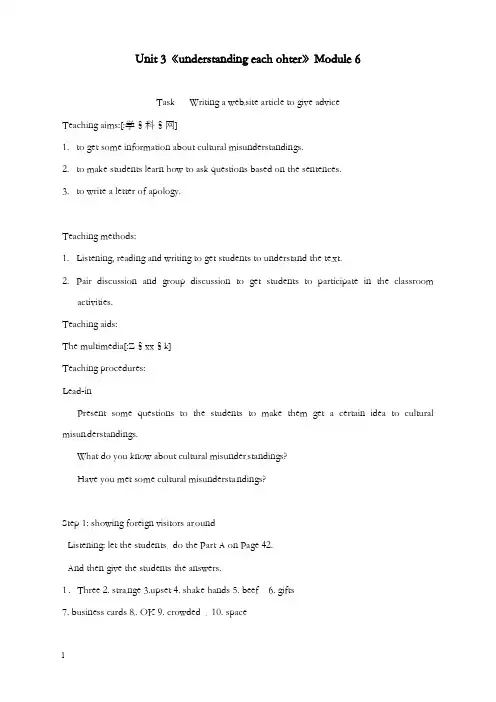
Unit 3《understanding each ohter》Module 6Task Writing a web site article to give adviceTeaching aims:[:学§科§网]1.to get some information about cultural misunderstandings.2.to make students learn how to ask questions based on the sentences.3.to write a letter of apology.Teaching methods:1.Listening, reading and writing to get students to understand the te xt.2.Pair discussion and group discussion to get students to participate in the classroomactivities.Teaching aids:The multimedia[:Z§xx§k]Teaching procedures:Lead-inPresent some questions to the students to make them get a certain idea to cultural misun derstandings.What do you know about cultural misunderstandings?Have you met some cultural misundersta ndings?Step 1: showing foreign visitors aroundListening: let the students do the Part A on Page 42.And then give the students the answers.1.T hree 2. strange 3.upset 4. shake hands 5. beef 6. gifts7. business cards 8. OK 9. crowded 10. spacePart B on Page 43.[:学§科§网]Paragraph 2…, if you are from India, you may not eat beef because of your religion.Paragraph 3In India, it is impolite to shake hands or give someone something with your left hand, Japanese people may bow and even g ive out their business cards to greet others and get upset if people do not look at the cards carefully. So remember not to just put them in your poc ket without looking.Part C on Page 431. uncomfortable2. gifts3. the USA4. small changeStep 2: Skills building 2 asking questionsStep 3: writing an articlewrite an article about a letter of apology.Get the students to know the things about the letter:Your addressThe dateAn openingThe purpose of the letter should be given in the first sentenceAn explanationA closing phraseYour name and signatureHomeworkWrite the letter about explaining misunderstandings in Step 3 on Page 45.*************************************。

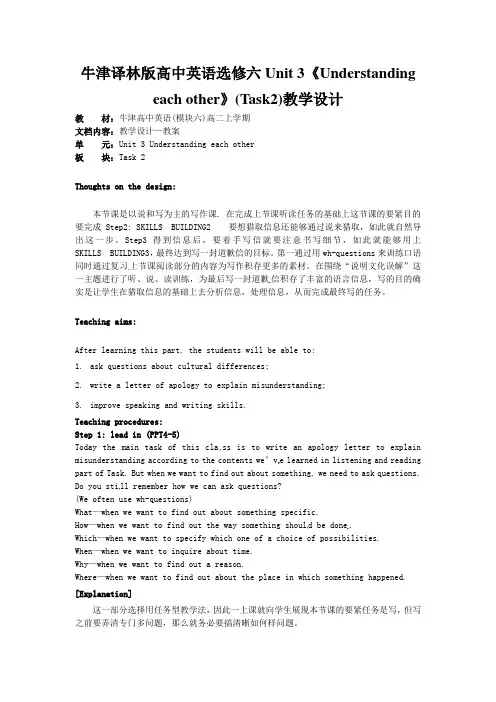
牛津译林版高中英语选修六Unit 3《Understanding each other》(Task2)教学设计教材:牛津高中英语(模块六)高二上学期文档内容:教学设计—教案单元:Unit 3 Understanding each other板块:Task 2Thoughts on the design:本节课是以说和写为主的写作课. 在完成上节课听读任务的基础上这节课的要紧目的要完成Step2: SKILLS BUILDING2 要想猎取信息还能够通过说来猎取,如此就自然导出这一步。
Step3得到信息后,要着手写信就要注意书写细节,如此就能够用上SKILLS BUILDING3,最终达到写一封道歉信的目标。
第一通过用wh-questions来训练口语同时通过复习上节课阅读部分的内容为写作积存更多的素材。
在围绕“说明文化误解”这一主题进行了听、说、读训练,为最后写一封道歉信积存了丰富的语言信息,写的目的确实是让学生在猎取信息的基础上去分析信息,处理信息,从而完成最终写的任务。
Teaching aims:After learning this part, the students will be able to:1.ask questions about cultural differences;2.write a letter of apology to explain misunderstanding;3.improve speaking and writing skills.Teaching procedures:Step 1: lead in (PPT4-5)Today the main task of this cla ss is to write an apology letter to explain misunderstanding according to the contents we’v e learned in listening and reading part of Task. But when we want to find out about something, we need to ask questions. Do you sti ll remember how we can ask questions?(We often use wh-questions)What—when we want to find out about something specific.How—when we want to find out the way something shoul d be done.Which—when we want to specify which one of a choice of possibilities. When—when we want to inquire about time.Why—when we want to find out a reason.Where—when we want to find out about the place in which something happened. [Explanation]这一部分选择用任务型教学法,因此一上课就向学生展现本节课的要紧任务是写,但写之前要弄清专门多问题,那么就务必要搞清晰如何样问题。
Unit3 Understanding each other Grammar and usage教材:牛津高中英语(模块六)高二上学期文档内容:教学设计—教案单元:Unit 3 Understanding each other板块:Grammar and UsageThoughts on the design:本节课是一节语法教学课。
根据中学语法教学的目的,语法教学应在语篇中进行语法教学;在创设情景中进行语法教学;在完成任务中进行语法教学。
这节课的主要目标是达到学习虚拟语气一般条件句的三种时态的不同结构以及一般条件句的倒装结构。
通过文字、表格和练习对虚拟语气讲解,使得复杂的语法通俗明了,浅显易懂;再利用设计好的语言情景,加以运用和巩固,以笔头、口头等多种形式将语法练习有机地、灵活地融会于各种课堂任务之中。
通过对比归纳,有助于学生从整体上进行掌握,帮助学生将语法知识加以巩固和“内化”,以培养学生自主学习与探究的能力,提高准确使用语言的能力。
Teaching aims:After learning this part, the students will be able to:1. use unreal conditionals of the present, past or future time;2. improve reading abilities and the ability of using unreal condit ionals;3. master some useful language points.Teaching procedures:Step 1 Lead-in1. Translate the following sentences on the blackboard.如果我是一只小鸟,我就能飞了。
If I w ere a bird, I could fly.Is it possible for you to be a bird?The situations are not real or are imaginary. We call them unreal conditionals.Unreal conditionals state a condition or situation that is not real or is imaginary.2. Find out the unreal conditional sentences mentioned in the reading part.If you had joined the chat room ten minutes ago, you would have known what we were talking about.If I got married in the UK, I would expect a present.If I got married in Italy, I would have to give a present.Should you come to Brunei, you would have to take off your shoes before goinginto someone’s house.[Explanation]为了使枯燥的语法课变得生动有趣,所以在导入部分用了一句浅显易懂的句子导入新课,让学生知道什么是虚拟语气,然后通过复习的方式将阅读课中出现的虚拟语气句一一找出,对虚拟语气有进一步的了解。
Unit 3 Understanding each other--Task Writing a letter同步练习I. 答复下列问题:(每题4分,共30分)1. What is the first thing we need to do before listening? Why should we do this?___________________________________________________________________________ ______2. What should we do next?___________________________________________________________________________ ______3. How can we decide what the missing words probably are?___________________________________________________________________________ ______4. What is the fourth point about?___________________________________________________________________________ ______5. What do you think we should do after we have finished a passage?___________________________________________________________________________ ______II. 用所给单词或短语的适当形式填空:(每题2分,共20分)1. The bus was ___________ because a tree had fallen across the road.2. The man _____________ was her husband.3. He has a very small room and most of the space is ___________ by a grand piano.4. He __________to learn that he had been left out of the team.5. They ______________ and began a conversation at once.6. The teacher __________ the exam papers.7. Women, ______________, live longer than men.8. He _____________ all the money his father gave him.9. Unfortunately, I _______________ the wrong person again.10. Have you ever been _____________ your sister recently?III . 阅读理解:(每题5分,共40分)AAlthough many Chinese students say that their knowledge of English grammar is good, most would admit that their spoken English is poor .Whenever I speak to a Chinese student they always say, “M y spoken English is poor.〞However, their spoken English does not have to remain “poor〞! I would like to suggest that there may be some reasons for their problems with spoken English.First, they fail to find suitable words to express themselves due to a limited vocabulary. Obviously the better answer is to expand their vocabulary. However, you can speak with a limited vocabulary, if your attitude is positive .Other will follow you as long as you use the words that you know.Second, they are afraid of making mistakes. Sometimes they mistakes when they are speaking because they are shy and nervous. Yet students should remember that their goal should be FLUENCY NOT ACCURACY. Your aim in writing is to be accurate following the rules for grammar and using the right words and spelling them correctly .However, in speaking your aim is fluency. You want to get your message across ,to talk to someone in English, as quickly and as well as you can, even though sometimes you may use a wrong word or tense, but it doesn’t matter because the person you are speaking to will understand you and make allowances for any mistakes he hears.The third reason is that not enough attention is paid to listening. You have one mouthbut two ears! All that hearing was necessary for you to start speaking.Forth, most Chinese students are reactive rather than proactive language learners .Instead of actively seeking out opportunities to improve their spoken English they passively wait for speaking opportunities to come to them and wonder why their English always remains poor. If you have this proactive outlook, then you will see English opportunities wherever you go.If you do not use your English beyond the classroom you will forget what English you know .Remember: USE IT OR LOSE IT! You can learn how to speak English better by speaking English more.1. What is most probably the writer’s purpose in writing the passage?A. To improve your reading.B. To improve your listening.C. To improve your spoken English.D. To improve your vocabulary.2. It can be inferred from the third paragraph that_____________.A. don’t be fluency. Just be accuracyB. don’t be nervous, don’t be shy .Just write!C. don’t be afraid of making mistakes. Just speak!D. don’t be shy , don’t be fluency. Jus t listen and write!3. The last paragraph is possibly close to the meaning of “ ___________〞.A. more hurry, less speedB. better late than neverC. silence is goldD. practice makes perfect4. The text is most probably taken from a_____________.A. teacher’s diaryB. report on studyC. sports newspaperD. movie magazineBImmediately I got up and dressed, stuck my violin under my jacket ,and went out into the street to try my luck. I wandered about for an hour, looking for a likely spot, feeling as though I were about to commit a crime. Then I stopped at last under a bridge near the station and decided to have a try.I felt tense and nervous. One moment I was part of the hurrying crowds, the next I stood apart, my back to the wall, my hat on the pavement before me, the violin under my chin.The first few notes I played were loud and raw, then they settled down and began to run more smoothly. To my surprise I was neither caught nor told to shut up. Indeed, nobody took any notice at all. Then an old man without stopping secretly threw a penny into my hat, as if getting rid of some guilty evidence.Other pennies followed, slowly but steadily, dropped by shadows who appeared not to see or hear me .It seemed too easy, like a secret trick.I worked there for several days, gradually getting the truth of the trade by trial and error (反复试验). It was not a good thing for example, to let the hat fill up with money;nor was it wise to empty it completely. Placing a couple of pennies in the hat to start the thing going soon became a regular rule.5. When he first began to play the violin ,he expected _______________.A. to earn a lot of moneyB. to meet some familiar peopleC. to play better than he didD. to be told to move to somewhere else6. He gradually became confident that day because___________.A. nobody looked at himB. he played the violin very wellC. people continued to give him moneyD. he earned a lot of money7. In the following days, he____________.A. made a lot of mistakesB. learned how to do the job betterC. got better at playing the violinD. did not make so much money8. He found that the best way of encouraging people to give him money was to ___________.A. play in different streetsB. leave all the money in the hatC. empty the hat at regular timesD. leave a small amount of money in the hatIV. 书面表达(此题共20分)假设你是云南省贫困地区的一名失学儿童,名叫刘江。
Unit3 Understanding each other Reading1教材:牛津高中英语(模块六)高二上学期文档内容:教学设计—教案单元:Unit 3 Understanding each other板块:Reading 1Thoughts on the design:本节课是以阅读为主的课文教学,所有教学设计都是围绕这篇阅读而进行通过阅读,学生将取得不同国家文化的信息,学会跨文化交流。
让学生带着问题进行阅读,用略读和寻读的方式来回答一些针对文章的主旨大意和细节内容。
完成讲义提供的多样的阅读练习,旨在帮忙学生加深对文章的理解,一培育学生获取信息和处置信息的能力。
通过阅读,指导学生运用阅读策略“如何更好地理解文中所举的例子”,并将这种策略运用到实践中去,以便能更好地理解文章,从而培育和提高阅读能力。
Teaching aims:After learning this part, the students will be able to:1.learn how to talk about cultural differences and customs;2.understand the use of examples;3.master useful vocabulary and sentences.Teaching procedures:Step 1: Revision &Lead-in (PPT4-5)Show some pictures about cultural differences.Have a free talk about them with the whole class.People from different countries greet each other in different ways because the different cultures. So i t is necessary to know the differences among different cultures. So we see without knowing the differences we may misunderstand each other. [Explanation]通过对不同国家不同问候方式的温习和它可能会给不了解文化不同的人带来一些误解,从而引出本课话题:在几个不同的国家,节日,婚宴,日常生活适应有哪些不同呢?设计目的重在鼓励学生自由讨论各国间的一些文化不同。
Unit 3 Understanding each other--Self-assessment 同步练习I. 听力:(每题1.5分,共30分)第一节:请听下面5段对话;每段对话后有一个小题,从题中所给的A、B、C三个选项中选出最正确选项,并标在试卷的相应位置。
听完每段对话后,你都有l0秒钟的时间来答复有关小题和阅读下一个小题。
每段对话仅读一遍。
1. What do scientists think of the advertisements on TV?A. They are boring.B. They are good for our eyes.C. It’s a waste of time to advertise on TV.2. How many knives did the man buy?A. Three.B. Two.C. One.3. How long have the speakers been waiting?A. Half an hour.B. An hour.C. An hour and a half.4. When is the wedding ceremony?A. This Sunday morning.B. This Saturday morning.C. Next Wednesday.5. Where does the conversation most probably take place?A. In a library.B. In a bookstore.C. In a shop.第二节:听下面5段对话或独白。
每段对话或独白后有几个小题,从题中所给的A、B、C三个选项中选出最正确选项,并标在试卷的相应位置。
听每段对话或独白前,你将有时间阅读各个小题,每题5秒钟;听完后,各小题将给出5秒钟的作答时间。
每段对话或独白读两遍。
听第6段材料,答复第6至7题。
6. What happened to Mike?A. He was knocked down in the street.B. He got injured in a match.C. He hurt his back.7. Who told the woman about Mike’s stay in hospital?A. Tom.B. Bob.C. A doctor.听第7段材料,答复第8至10题。